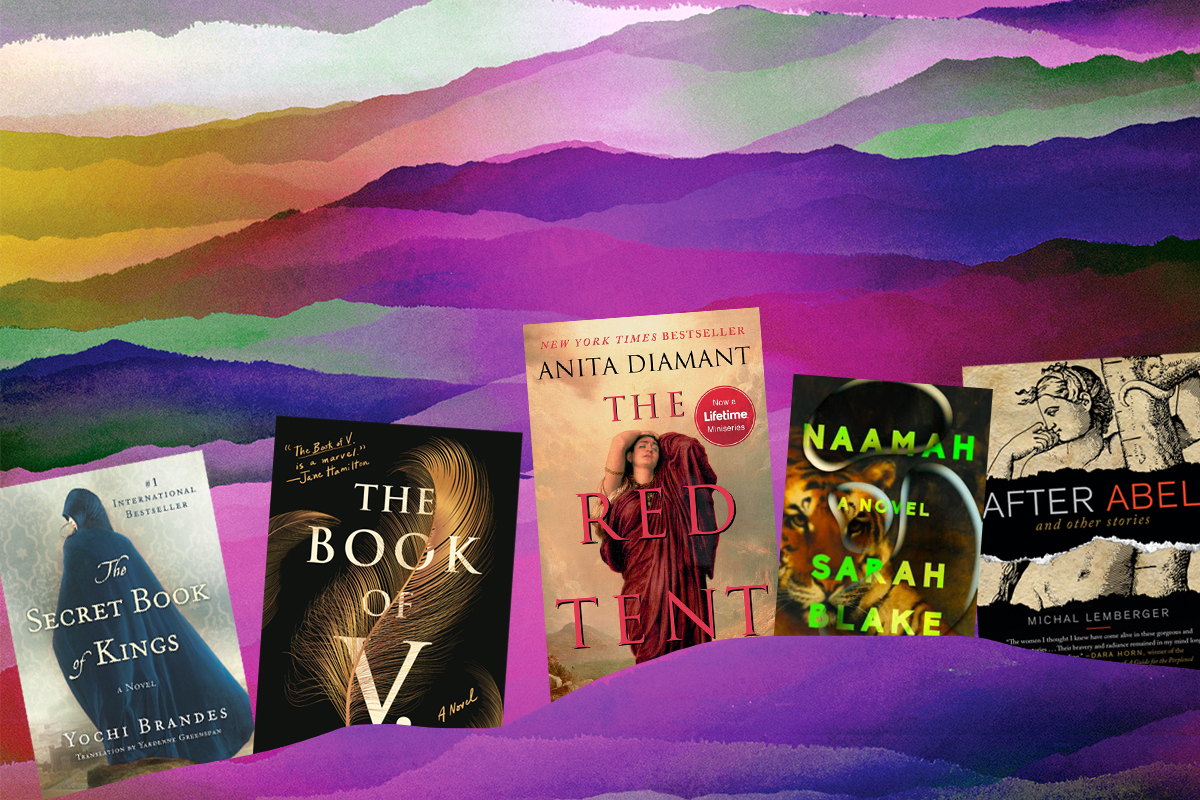Genuinely all I remember from my seven years of Hebrew school is the V’ahavta, a continuation of the Shema prayer. It’s been so engrained in my memory that I can still recite it from start to finish. Of course, I also know the Passover story, but more from my family’s seders (and Prince of Egypt) than any dedicated Hebrew school learning. I know the basics of Hanukkah. (I do, however, Google the prayers every year.) But I’ll be honest, until a few years ago, my Jewish knowledge was pretty rudimentary.
There have been three things that have filled that gap: one, a “Women and the Bible” course I took my senior year of college to complete my religion minor, introducing me to biblical heroines from Hannah to Delilah to Ruth, replete with feminist analysis. Two, being hired for this site you are reading, a Jewish culture site. And three, since I am a big reader, consuming as many retellings of biblical stories as I can.
What I love about this kind of book is that they don’t just re-tell the stories — they reinvent them. These writers take either a well-known story or a minor character and bring them to life, vividly, through fiction. It’s the same reason I love books like Madeline Miller’s Circe or Jennifer Nansubuga Makumbi’s Kintu, and why I was obsessed with the Percy Jackson series; these retellings take foundational myths and rewrite them in completely engaging ways.
So without further ado, here are five feminist retellings of biblical stories you must read, based on my personal favorites and recommendations from Twitter. (Thank you to everyone who replied to my tweet!) (And, uh, I guess I’ll put this disclaimer: If you’re somehow here looking for Christian Bible stories, you are in the wrong place.)
1. The Red Tent by Anita Diamant
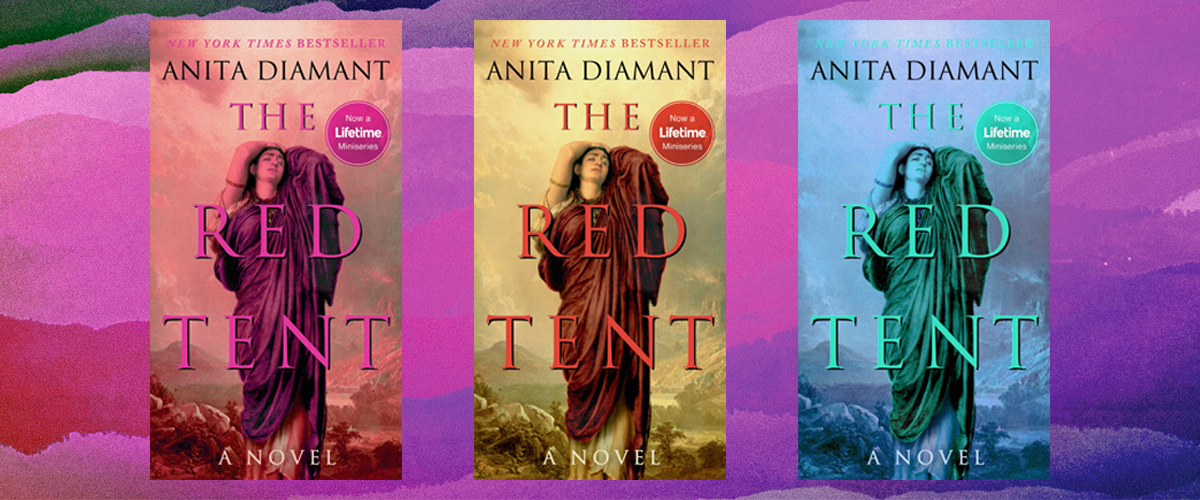 It’s a rule that all lists about feminist biblical retellings must start with The Red Tent, right!? First published in 1997, The Red Tent tells the story of Dinah, the daughter of Jacob and Leah. If you thought Jacob just had 12 sons, you thought wrong. I remember reading The Red Tent for the first time, and being blown away by the vividness with which Diamant tells Dinah’s story, and the story of Jacob’s first wife, Leah. The titular red tent refers to the tent where women had to go when they were menstruating or giving birth. In Genesis, all we learn is that Schechem “defiled” Dinah, although he is described as being “in love with the maiden.” In Diamant’s retelling, Dinah is in love with Schechem — and willingly becomes his bride. I love this line from a Los Angeles Times review in 2000: “By giving a voice to Dinah, one of the silent female characters in Genesis, the novel has struck a chord with women who may have felt left out of biblical history. It celebrates mothers and daughters and the mysteries of the life cycle.”
It’s a rule that all lists about feminist biblical retellings must start with The Red Tent, right!? First published in 1997, The Red Tent tells the story of Dinah, the daughter of Jacob and Leah. If you thought Jacob just had 12 sons, you thought wrong. I remember reading The Red Tent for the first time, and being blown away by the vividness with which Diamant tells Dinah’s story, and the story of Jacob’s first wife, Leah. The titular red tent refers to the tent where women had to go when they were menstruating or giving birth. In Genesis, all we learn is that Schechem “defiled” Dinah, although he is described as being “in love with the maiden.” In Diamant’s retelling, Dinah is in love with Schechem — and willingly becomes his bride. I love this line from a Los Angeles Times review in 2000: “By giving a voice to Dinah, one of the silent female characters in Genesis, the novel has struck a chord with women who may have felt left out of biblical history. It celebrates mothers and daughters and the mysteries of the life cycle.”
Biblical jumping off point: Genesis 34, which begins: “Now Dinah, the daughter whom Leah had borne to Jacob, went out to visit the daughters of the land. / Shechem son of Hamor the Hivite, chief of the country, saw her, and took her and lay with her by force.” Get the book here.
2. The Book of V. by Anna Solomon
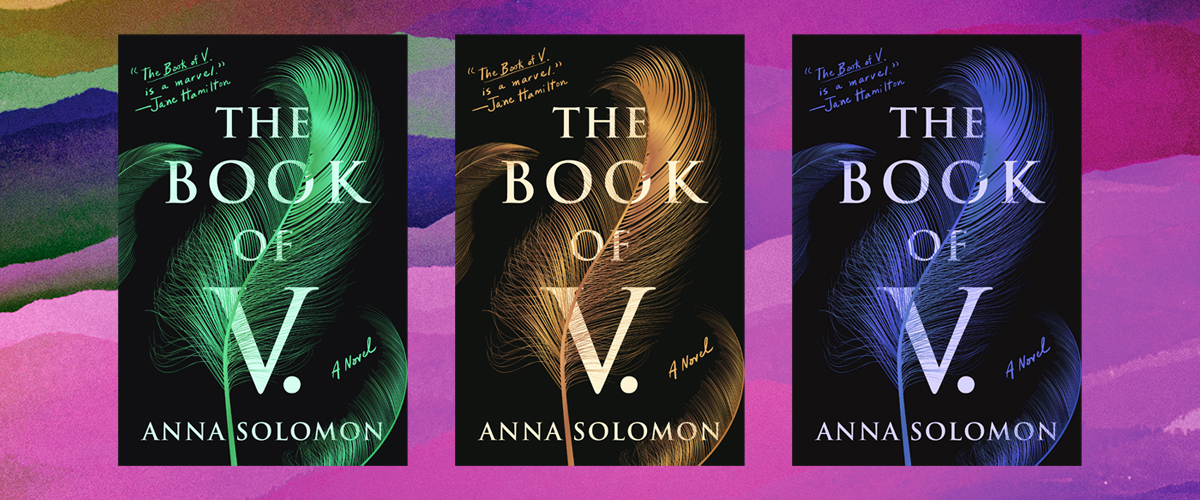
This book actually inspired this listicle! (Booksticle?) One of our favorite books coming out in spring 2020, The Book of V. tells the story of Vashti and Esther (you know, from the Purim story) like you’ve never heard it before. It is set over three different timelines: Ancient Persia, where the OG tale is told with a new perspective; 1970s New England; and present-day Brooklyn. Each timeline masterfully makes you rethink the classic Purim tale, and finally gives Vashti her due.
When I chatted with Anna for Kveller, I asked what the challenges were in taking a story that Jews know so well and making it feel fresh. She replied, “There’s a very Jewish word to answer that question, which is chutzpah. It took fighting off the voices that said, You’re not allowed to do this. Or, What if people are offended by your take on this story. One of the great things about fiction — at least myself in fiction — is that I’m not making an argument. I’m not saying, This is what really happened. Or, This is how you must think about the story. I’m asking questions; my hope is that I’m opening up possibilities for people to consider.” And that definitely is true for The Book of V. and all the retellings on this list.
Biblical jumping off point: The Book of Esther!! Get the book here.
3. After Abel and Other Stories by Michal Lemberger
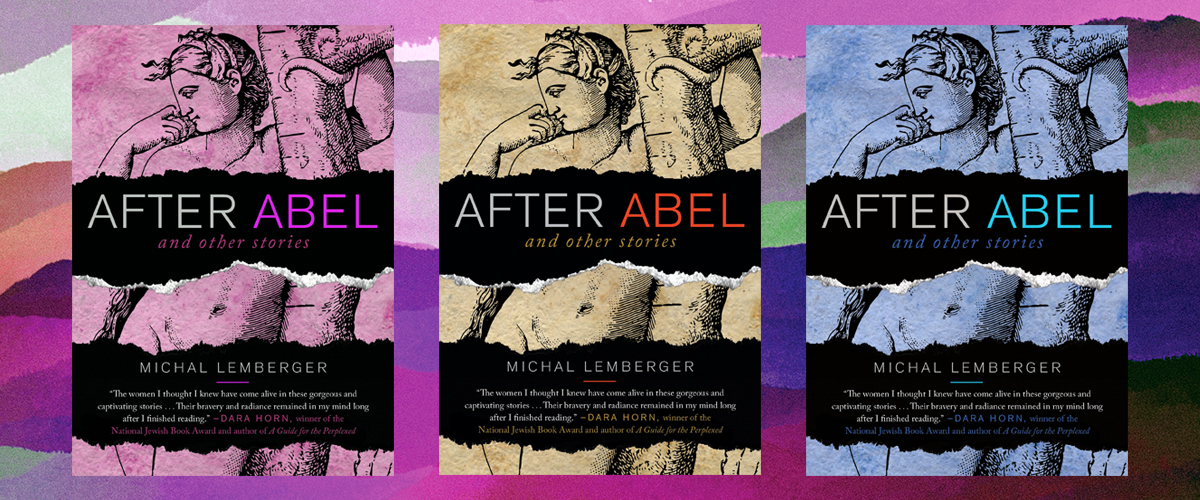
There are nine stories in this stunning short story collection, which begins with the titular “After Abel,” telling the story of Eve. As Erika Dreifus writes in JTA, “Each of the nine stories in this book presents a tale of a biblical woman. Some you’ve likely heard of, like Miriam, who sets the basket holding her baby brother afloat in Nile, follows its course and approaches the woman who retrieves it: Pharaoh’s daughter. Others focus on characters who are less well known, such as Zeresh, Haman’s not-so-nice spouse, who suffers consequences, just as her husband does when his evil plot goes awry.” In the foreword to After Abel, Jonathan Kirsch explains, “Above all, [Lemberger] is able to enter and inhabit characters who exist for us today only as stray lines of text in the Bible, and she allows us to see the biblical landscape through their eyes.” What more could you ask for??
Biblical jumping off point: Okay, not one specific story but I also don’t want to just say “uhh, the Bible.” Lemberger actually starts each chapter with the Biblical quote she jumps off of — “After Abel,” for example, begins with Genesis 4:25, and “Lot’s Wife” starts with Genesis 19:6-8. Get the book here.
4. Naamah by Sarah Blake
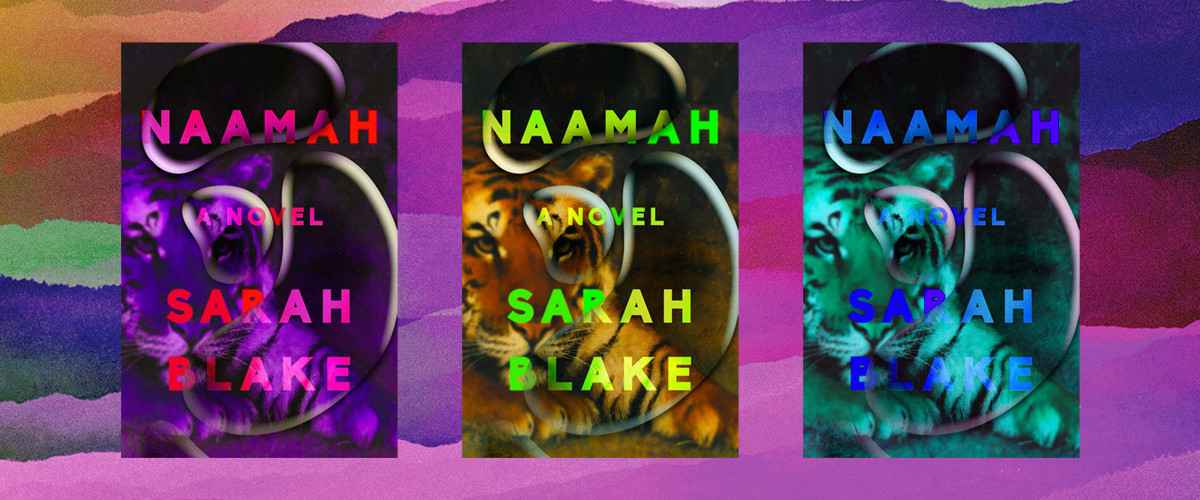
We all learn the story of Noah and his ark, but we never really think about Noah’s wife. Or at least, I never really thought about Noah’s wife until I read Sarah Blake’s magnificent Naamah, the name she gives to Noah’s wife (because she actually doesn’t have one in the Bible). “As an adult, I’m realizing that some of the reasons I was less interested in [biblical stories] was me making assumptions that I think were kind of passed down through the patriarchy,” Blake explained to me last year. “If I actually look at those stories with my own contemporary feminist understanding, they are women I can identify with. It kind of made the Bible open up to me in a whole new way, to realize those stories can look very different.” The novel reads a lot like prose poetry; it’s a beautiful retelling of a Biblical heroine who deserves so much more.
Biblical jumping off point: the story of Noah’s Ark in Genesis, specifically when Noah’s wife is mentioned in Genesis 6:18, “But I will establish My covenant with you, and you shall enter the ark, with your sons, your wife, and your sons’ wives.” Get the book here.
5. The Secret Book of Kings by Yochi Brandes (translated from Hebrew by Yardenne Greenspan)
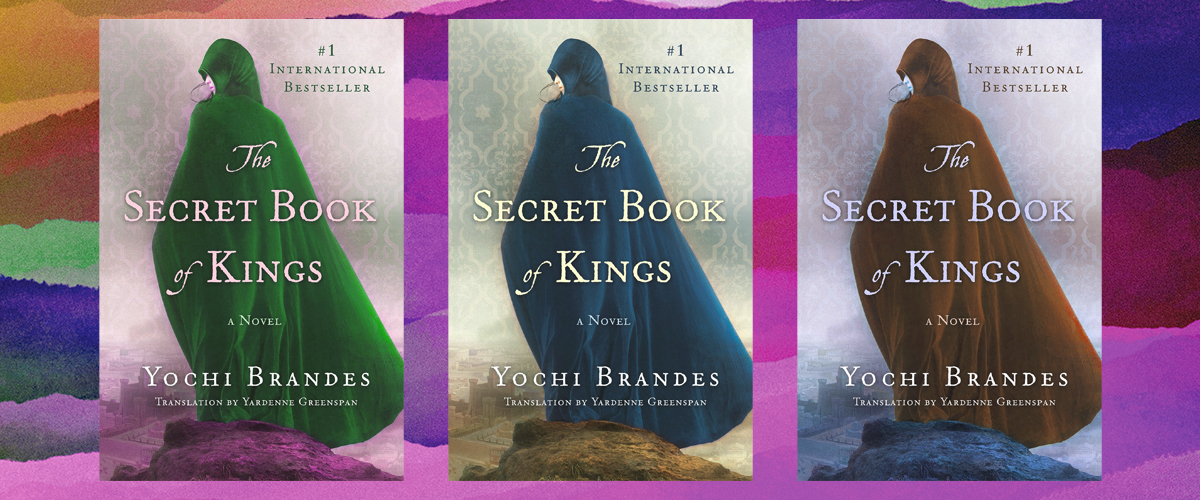
The Secret Book of Kings is the story of King David seen through the eyes of Michal, King Saul’s daughter and King David’s abandoned queen. I could not put this book down when I read it. It throws you into the ancient kingdoms of Judah and Israel, and brings to life the seemingly larger-than-life characters of the Bible. I just love the description so I’m going to share it here: “The Secret Book of Kings is a sweeping biblical epic filled with court intrigue, romance, and rebellion. It engages with the canonized stories of the Kingdom of Israel’s foundation and turns them on their heads. Brandes, known for her profound familiarity with Jewish sources, uncovers vibrant, adversarial men and woman buried deep in the scriptures and asks the loaded question: to what extent can we really know our past when history is written by the victors?” And to add to that: What can we really know when history is written by men?
Biblical jumping off point: The second Book of Samuel! Get the book here.
Header image design by Emily Burack.
